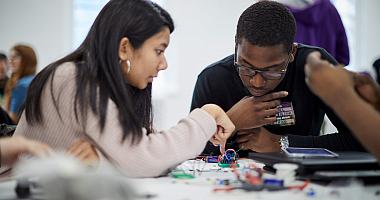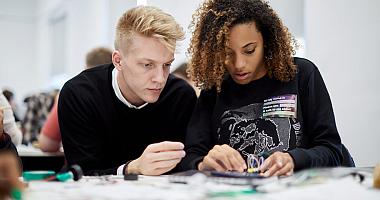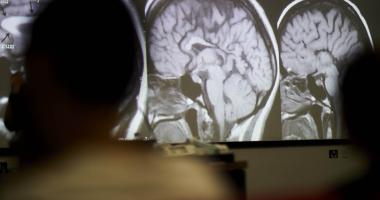BSc (Hons)
Business Computing (Systems Analysis)
Explore how technology is used to analyse business and information systems. Learn how to re-engineer and design new IT products and services that solve genuine business problems, and develop valuable skills for your future career.
Content navigation menu
Why study BSc Business Computing (Systems Analysis) at Goldsmiths
- This industry-focused pathway has been designed in conjunction with industry leaders to cover the major developments in IT today.
- You'll cover a wide range of topics including business process reengineering, organisational behaviour, big data, the internet of things, user experience and user-centred design.
- You'll gain a detailed understanding of the major concepts, technologies and techniques employed by systems analysts when analysing business process reengineering, services, products and business processes to create value.
- You'll study how systems analysts are used in the decision-making processes of modern organisations, and gain an understanding of how they use artificial intelligence techniques for business and analytical processing.
- The degree includes the opportunity for you to undertake a year-long placement in industry, enabling you to gain work experience, build confidence and contacts, develop your skills and industry insight, and enhance your career prospects.
- You'll apply a range of systems analysis techniques to design creative strategies for pursuing, exploiting and further developing new opportunities.
- You'll learn to engage in critical thinking by analysing organisational situations and constructing and selecting viable business systems and technologies to solve problems.
- By the end of your degree you’ll have built a portfolio of work to kickstart your career.
Contact the department
If you have specific questions about the degree, contact Professor James Ohene-Djan.
UCAS code
IN13
Entry requirements
A-level: BBB
BTEC: DDM
IB: 33 points overall with Three HL subjects at 655
Length
3 years full-time; 4 years full-time with a placement year; 6-7 years part-time
Fees
Home - full-time: £9250
International - full-time: £20160
Department
What you'll study
From the start of your degree, you'll be developing your own projects and digital ventures, which will increase in scale and ambition.
You'll also learn creative thinking and business techniques by studying topics such as user-centred design and digital venture creation, and develop key professional skills such as teamwork, project pitching, and project management.
While studying with us you will benefit from the Goldsmiths Department of Computing's unique interdisciplinary approach to teaching the subject, informed by our wealth of expertise in the arts, humanities, and social sciences.
You will notice this through the engaging and accessible way that we teach programming on compulsory modules, but also through fascinating optional topics – such as physical computing and virtual reality – that you'll get to explore in your final year.
Year 1
In your first year, you'll take the following compulsory modules:
| Module title | Credits |
|---|---|
| Identity, Agency & Environment 1 | 15 credits |
| Introduction to Programming | 15 credits |
| Designing Digital Interactions | 15 credits |
| Strategic Management | 15 credits |
| Identity, Agency & Environment 2 | 15 credits |
| Computing Project 1 | 15 credits |
| Business Enterprise in the Digital Era | 15 credits |
| Introduction to Statistics for Business and User Experience | 15 credits |
Note about optional modules (if available): The above is indicative of the typical modules offered, but is not intended to be construed or relied on as a definitive list of what might be available in any given year. The module content and availability is subject to change.
Teaching style
This programme is taught through a mixture of lectures, tutorials, workshops and laboratory sessions. You’ll also be expected to undertake a significant amount of independent study. This includes carrying out required and additional reading, preparing topics for discussion, and producing essays or project work.
How you'll be assessed
You’ll be assessed by a variety of methods, depending on your module choices. These may include coursework, examinations, group work and projects. If you opt for an industrial placement year, your placement tutor will assess your work. If you complete the placement year successfully, you earn the endorsement 'with work experience' on your degree certificate.
Credits and levels of learning
An undergraduate honours degree is made up of 360 credits – 120 at Level 4, 120 at Level 5 and 120 at Level 6. If you are a full-time student, you will usually take Level 4 modules in the first year, Level 5 in the second, and Level 6 modules in your final year.
Facilities
The Department of Computing has a wealth of specialist labs and facilities that enable students and academics to create cutting-edge work.
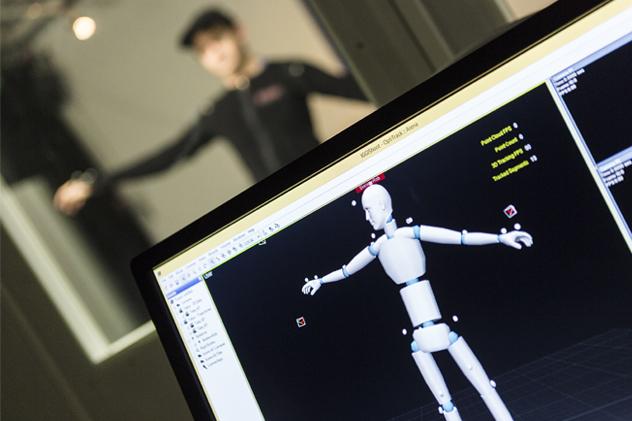
Computing facilities at Goldsmiths include a VR lab equipped with a full multi-camera motion capture studio, similar to that used in the making of Avatar and The Last of Us.
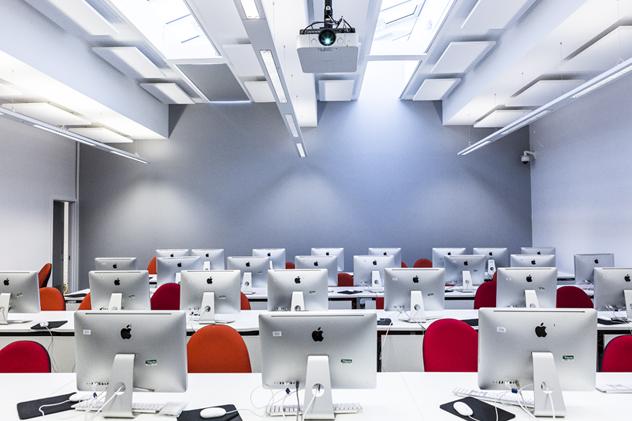
The Goldsmiths computer suites are equipped with more than 200 iMacs running Windows 10 and MacOS in parallel.
Careers
The explosive and ever-growing use of technology in business and enterprise means that there are a whole range of different career possibilities for computing graduates.
In terms of job opportunities and salaries, the IT sector is well ahead of most other industrial and commercial sectors.
Where do Goldsmiths computing graduates work?
Some of the recent graduate-level careers for computing alumni have included:
- User interface/user experience designer
- Mobile developer
- Full-stack web developer
- Software engineer
- E-learning programmer
- Application programmer
- App developer
- Video game developer
- Film special effects and post-production
- Computer music/sound engineer
- Systems analyst
- Database manager
Employers include:
The pace of change in the computing sector is rapid, and you may be pursuing careers and using digital methods we cannot yet imagine. You can read more about possible career options after you graduate on our computing careers page.
Skills
Throughout the degree you will learn skills including:
- Business systems analysis and design skills – from design thinking and product development through to business creation and commercialisation
- Core business competencies in finance, marketing, management and innovation
- An understanding of the security, legal and ethical issues that may arise when computing systems are used in business
- Creative techniques including brand storytelling
- Technical know-how such as data analysis and visualisation
- Programming skills, including those required to design and build business computing systems for
internet and mobile environments - Project management
- Teamwork and collaboration
All modules will prepare you for the future as a business computing entrepreneur or global business leader with a technology focus.
Industrial placement year
If you decide to take the industrial placement year, you will develop the practical skills and real-world experience that is sought after by employers.
Some of the companies students have worked at during their work placement year recently include:
Entry requirements
We accept the following qualifications:
A-level: BBB
BTEC: DDM
International Baccalaureate: 33 points overall with Three HL subjects at 655
Access: Pass with 45 Level 3 credits including 30 Distinctions and a number of merits/passes in subject-specific modules
Scottish qualifications: BBBBC (Higher) or BBC (Advanced Higher)
European Baccalaureate: 75%
Irish Leaving Certificate: A1 A1 A2 B1
Additional requirements
If you don't have a Science- or Mathematics-based A-level, you should normally have at least Grade B/Grade 6 at GCSE Mathematics. If you're already studying for the BSc in Computing and Information Systems on the University of London International Programme, you may transfer into the second or third year of this degree.
Alternative qualifications and experience
See our full list of undergraduate entry qualifications.
We welcome students with a range of educational experiences. If you believe you may not meet the standard qualification requirements we would still encourage you to apply because we consider all aspects of your application when making a decision.
We’ll pay particularly careful attention to your personal statement, which is your opportunity to demonstrate your interest in the subject you’ve applied for. Your referees are also welcome to include any relevant contextual comments around your academic achievements. We’ll look at all these things when making a decision on your application, as well as your qualifications and grades.
International qualifications
We also accept a wide range of international qualifications. Find out more about the qualifications we accept from around the world.
If English isn’t your first language, you will need an IELTS score (or equivalent English language qualification) of 6.0 with no element lower than 5.5 to study this programme. If you need assistance with your English language, we offer a range of courses that can help prepare you for degree-level study.
Fees and funding
Annual tuition fees
These are the UG fees for students starting their programme in the 2024/2025 academic year.
From August 2021 EU/EEA/Swiss nationals will no longer be eligible for 'Home' fee status. EU/EEA/Swiss nationals will be classified as 'International' for fee purposes, more information can be found on our fees page.
- Home - full-time: £9250
- International - full-time: £20160
If your fees are not listed here, please check our undergraduate fees guidance or contact the Fees Office, who can also advise you about how to pay your fees.
It’s not currently possible for international students to study part-time if you require a Student Visa, however this is currently being reviewed and will be confirmed in the new year. Please read our visa guidance in the interim for more information. If you think you might be eligible to study part-time while being on another visa type, please contact our Admissions Team for more information.
If you are looking to pay your fees please see our guide to making a payment.
Funding opportunities
We offer a wide range of scholarships and bursaries, and our Careers Service can also offer advice on finding work during your studies. Find out more about funding your studies with us.
Additional costs
In addition to your tuition fees, you'll be responsible for any additional costs associated with your course, such as buying stationery and paying for photocopying. You can find out more about what you need to budget for on our study costs page.
There may also be specific additional costs associated with your programme. This can include things like paying for field trips or specialist materials for your assignments. Please check the programme specification for more information.


